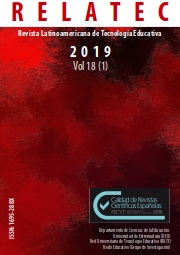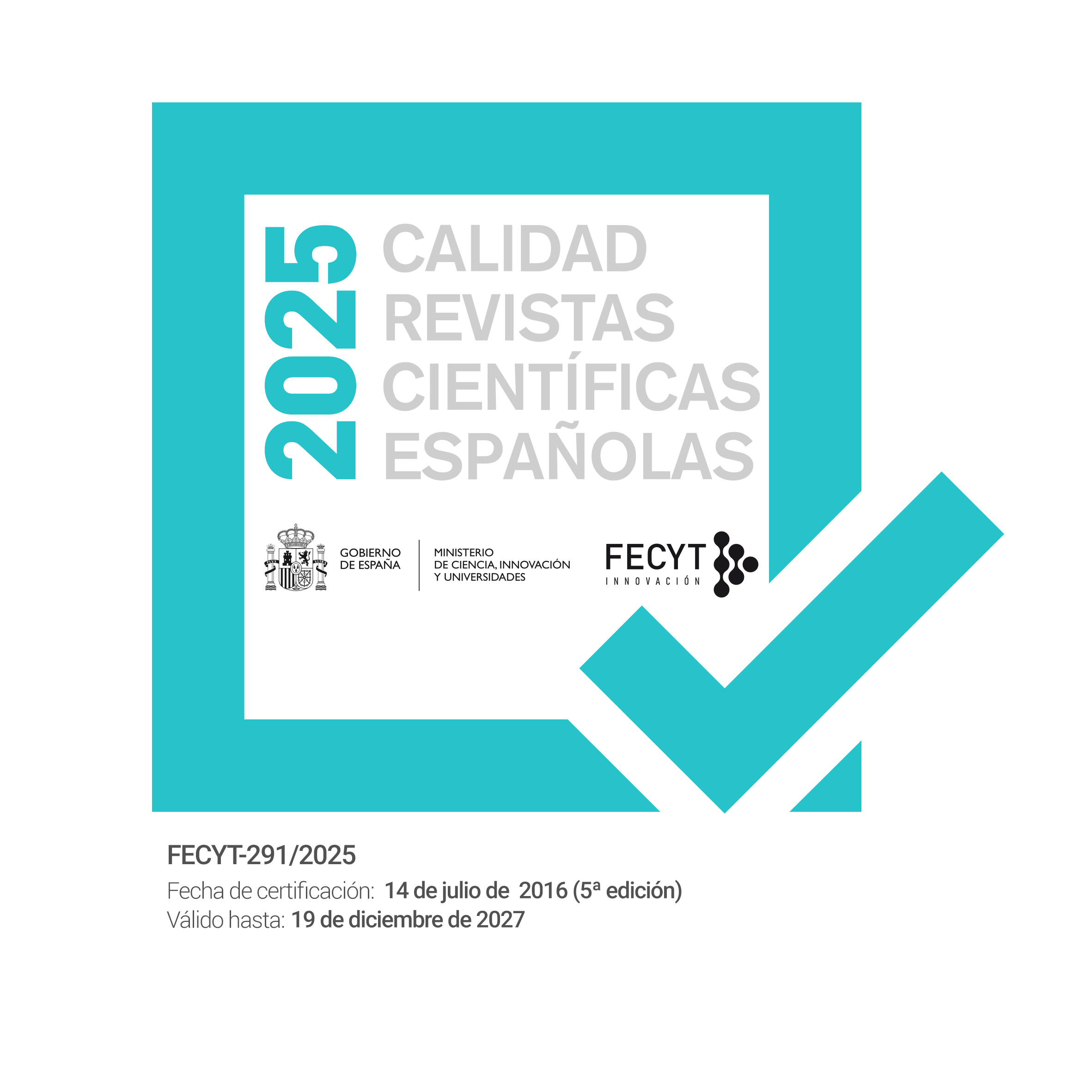Professional Formation in e-learning environments. Case study about the Project-Based Learning (PBL) in postgraduate virtual course
DOI:
https://doi.org/10.17398/1695-288X.18.1.91Keywords:
Master's Programs, e-Learning, Professional Development, Project Based LearningAbstract
More governments have supported the development of their knowledge through strategies and policies to improve higher education, innovation and research. In Latin America, the incorporation of technological systems for the construction of innovative learning environments is still incipient. The objective of the research is to characterize the scope of the Project-Based Learning (PBL) methodology in the professional training of teachers in an e-learning learning environment. A learning environment was designed in the virtual platform Blackboard, based on the systematization of five phases based on the PBL methodology, the methodological design of the instrumental case study was used with a sample of 60 students from different parts of Latin America (92% Mexico, 3% Colombia and 5% Ecuador), the data collection instruments that were used were ad hoc questionnaires and digital evaluation rubrics. The qualitative analysis of content shows a high frequency in the thematic categories of: linking of theoretical-methodological concepts, collaboration and teamwork skills, digital resources, programs and on-line platforms. It is concluded that impact of PBL methodology in Postgraduate courses favors the motivation of teachers in innovating their educational practice, as well as the generation of a high commitment in the collaborative work focused on the resolution of problems in social-educational contexts in students of a Master's program in Education with private funding, and emphasis on educational innovation training.
Downloads
References
Becker, A., Cummins, M., Davis, A., Freeman, A., Giesinger, C., & Ananthanarayanan, V. (2017). NMC Horizon Report: 2017 Higher Education Edition. Austin, Texas.: The New Media Consortium.
Borgobello, A., Sartori, M., & Roselli, N. (2016). ¿Cómo interactuamos aquí y allá? Análisis de expresiones verbales en una clase presencial y otra virtual a partir de dos sistemas de codificación diferentes. Revista de La Educacion Superior, 45(179), 95–110. Recuperado de: https://doi.org/10.1016/j.resu.2016.06.003
Breiter, A., Fey, G., & Drechsler, R. (2005). Project-based learning in student teams in computer science education. Electronics and Energetics, Special Issue on Computer Science Education, 18(2), 165–180. Recuperado de: https://doi.org/10.2298/FUEE0502165B
Creswell, J., & Poth, C. (2018). Qualitative Inquiry and Research Design. Choosing Among Five Approaches. (J. Creswell & C. Poth, Eds.) (4th ed.). E.U.A.: SAGE Publications, Inc.
Belda-Medina, J. (2018). El impacto del aprendizaje basado en proyectos (PBL) sobre las destrezas lingüísitcas y digitales de los estudiantes de Educación en ESL y CLIL. In El compromiso académico y social a través de la investigación e innovación educativas en la Enseñanza Superior universidad. Barcelona, España: Octaedro. Recuperado de: https://www.researchgate.net/publication/329842210_Belda-Medina-PBL-ICTs
Dabner, N., Davis, N., & Zaka, P. (2012). Authentic Project-Based Design of Professional Development for Teachers Studying Online and Blended Teaching. Contemporary Issues in Technology and Teacher Education, 12(1), 71–114.
Elo, S., Kääriäinen, M., Kanste, O., & Pölkki, T. (2014). Qualitative Content Analysis : A Focus on Trustworthiness. Recuperado de: https://doi.org/10.1177/2158244014522633
Kokotsaki, D., Menzies, V., & Wiggins, A. (2016). Project-based learning: A review of the literature. Improving Schools, 19(3), 267–277. Recuperado de: https://doi.org/10.1177/1365480216659733
Fernandes, M. A. (2016). Project Based Learning Applied to An Embedded Systems Course. International
Journal of Electrical Engineering Education, 54(3), 223–235. Recuperado de: https://doi.org/10.1177/0020720916675830
García-Aretio, L. (1999). Historia de la Educación a Distancia. RIED – Revista Iberoamericana de Educación a Distancia, 2 (1). 8-27. Recuperado de: http://www.utpl.edu.ec/ried/index.php?option=com_content&task=view&id=274&Itemid=53
Grant, M. M. (2011). Learning, beliefs, and products: Students' perspectives with project-based learning. Interdisciplinary Journal of Problem-Based Learning, 5(2), 9–27. Recuperado de: https://docs.lib.purdue.edu/cgi/viewcontent.cgi?article=1254&context=ijpbl
Habók, A., & Nagy, J. (2016). In-service teachers’ perceptions of project-based learning. SpringerPlus, 5(1), 1–14. Recuperado de: https://doi.org/10.1186/s40064-016-1725-4
Márquez-Jiménez, A. (2016). La desigualdad social y las reformas educativas. Perfiles Educativos, 38(154), 3–18. Recuperado de: http://www.redalyc.org:9081/home.oa?cid=6452919
Márquez-Lepe, E., & Jiménez-Rodrigo, M. L. (2014). Project-based learning in virtual environments: A case study of a university teaching experience. RUSC Universities and Knowledge Society Journal, 11(1), 76–90. Recuperado de: https://doi.org/10.7238/rusc.v11i1.1762
Meek, V. L., Teichler, U., & Kearney, M. (2009). Higher Education, Research and Innovation : Changing Dynamics. Report on the UNESCO Forum on Higher Education, Research and Knowledge 2001-2009. Alemania: UNESCO/International Centre for Higher Education Research Kassel.
Merriam, S., & Tisdell, E. (2016). Qualitative Research. A Guide to Design and Implementation (Fourth edi). San Francisco, California: Jossey-Bass.
Moore, J. L., Dickson-Deane, C., & Galyen, K. (2011). E-Learning, online learning, and distance learning environments: Are they the same? Internet and Higher Education, 14(2), 129–135. Recuperado de: https://doi.org/10.1016/j.iheduc.2010.10.001
OECD. (2019). OECD Statistics. Recuperado de: from https://stats.oecd.org/
Roessingh, H., & Chambers, W. (2011). Project-Based Learning and Pedagogy in Teacher Preparation: Staking Out the Theoretical Mid-Ground. International Journal of Teaching and Learning in Higher Education, 23(1), 60–71. Recuperado de: http://www.isetl.org/ijtlhe/
Scott, C. L. (2015). The Futures of Learning 3: what kind of pedagogies for the 21st century? Education Research and Foresight, 1–21. Recuperado de: https://doi.org/10.1016/j.pse.2015.08.005
Secretaría de Educación Pública. (2019). Estadísticas Básicas de Educación Superior, ciclo escolar 2017-2018. Recuperado de: http://www.dgesu.ses.sep.gob.mx/Estadisticas_Basicas_de_Educacion_Superior.aspx
Stake, R. (2007). Investigación con estudio de casos. Madrid, España: Ediciones Morata.
UNESCO. (2005). Hacia las sociedades del conocimiento. Francia, París: UNESCO.
Vázquez, N. R., Quiroz, A. M. A., Arcos, X. M. R., & Vargas, J. (2015). Implementación del ABP como método para promover competencias de colaboración un ambiente virtual (Webnode). Edutec. Revista Electrónica de Tecnología Educativa, (51), 1–13. Recuperado de: https://doi.org/10.21556/EDUTEC.2015.51.107
Walder, A. M. (2017). Pedagogical innovation in Canadian higher education: Professors´perspectives on its effects on teaching and learning. Studies in Educational Evaluation, 54, 71–82. Recuperado de: https://doi.org/10.1016/j.stueduc.2016.11.001
Downloads
Published
Issue
Section
License
Authors who publish in this journal accept the following conditions:
1. The Author retains copyright in the article. Upon acceptance of the article, the author shall grant to the Publisher the right of first publication of the article. with the dcoument registered with the Creative Commons Attribution-NonCommercial-NoDerivative 4.0 International (CC BY-NC-ND) license, which allows to third parties to use what is published whenever they mention the authorship of the work and the first publication in this journal.
2. Authors can make other independent and additional contractual agreements for the non-exclusive distribution of the article published in this journal (eg, include it in an institutional repository or publish it in a book) provided they clearly indicate that the work was published for the first time in this journal.
3. Authors are allowed and recommended to publish their work on the Internet (for example on institutional or personal pages) before and during the review and publication process, as it can lead to productive exchanges and a greater and faster diffusion of published work (see The Effect of Open Access).









